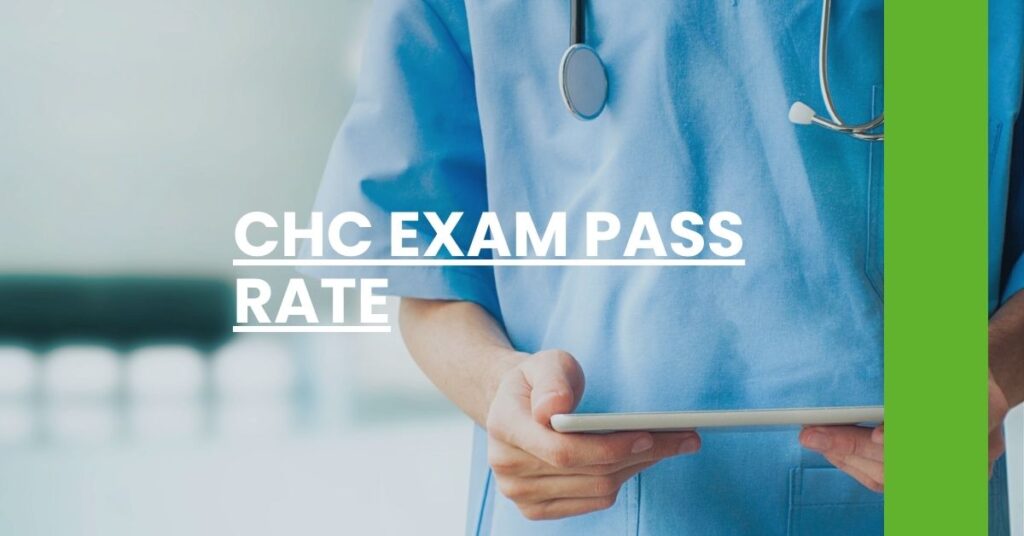The Certified in Healthcare Compliance (CHC) exam pass rate hovers around a notable 79% for first-time test takers. If you’re inquiring about your chances of passing this reputable certification, rest assured knowing that a significant majority of aspirants successfully clear the benchmark.
To bolster your preparation:
- Grasp historical pass rate trends
- Strategize with proven study techniques
- Compare CHC outcomes to other healthcare certificates
Eager to know more? The details in our concise yet insightful article await to guide and inspire your certification journey. 📈🏅
- Introduction to the Certified in Healthcare Compliance (CHC) Exam
- Understanding the CHC Pass Rate
- The Importance of Pass Rates in Professional Certifications
- Historical Data on CHC Exam Pass Rates
- Factors Influencing the CHC Exam Pass Rate
- How to Interpret Pass Rate Statistics
- Improving Your Odds: Strategies for CHC Exam Success
- Comparing CHC Pass Rates with Other Healthcare Certifications
- Navigating the CHC Certification Landscape
- Conclusion: The Significance of the CHC Exam Pass Rate
Introduction to the Certified in Healthcare Compliance (CHC) Exam
If you’re considering a leap into the world of healthcare compliance, the Certified in Healthcare Compliance (CHC) exam represents a crucial stepping stone. This exam tests your grasp of necessary regulations, standards, and practices essential for any professional navigating the complex healthcare compliance landscape. Certification not only demonstrates your dedication and expertise but also marks a distinguished level of achievement recognized across the industry.
Offered by the Compliance Certification Board (CCB), the CHC certification sets a standard of competence for professionals involved in healthcare compliance processes and ensures that they are up-to-date with the latest regulations. Achieving this certification could very well be a turning point in your career—whether you aspire to excel in a compliance role or are looking to ensure your organization upholds the highest standards of regulatory adherence.
Invariably, those seeking to earn their stripes in healthcare compliance must grapple with the CHC exam. Naturally, you’re curious about the CHC exam pass rate—it’s a metric that seems like a clear indicator of the exam’s difficulty. Understanding this rate is not just about gauging how hard the exam might be but also about discerning the rigor of the certification process and its credibility within the healthcare industry.
Understanding the CHC Pass Rate
When you hear about the CHC exam pass rate, know that it provides a snapshot of how many candidates pass the exam on their initial attempt. The pass rate is a percentage calculated by dividing the number of candidates who pass by the total number who took the exam during a specific period. Does a high pass rate mean the exam is easy, or does a low rate indicate it’s excessively difficult? These raw statistics can be deceptive, as they don’t always reflect the complexity of the test or the preparedness of the candidates.
For you, as a prospective test-taker, the pass rate should matter, but not be an end-all. It’s crucial to consider this data in the context of overall exam preparation and industry standards. Your focus should be on understanding what the pass rate signifies—what’s the big picture it paints regarding the certification’s value in your professional growth?
The Importance of Pass Rates in Professional Certifications
Pass rates for professional certifications sit at the heart of a much larger story. They often signify the exam’s standing among similar certifications and can even influence your decision to pursue one certification over another. A consistently high pass rate might suggest that an exam is well-matched to industry expectations and candidate preparation, or it could imply that it fails to challenge the depth and breadth of a candidate’s knowledge sufficiently.
In many ways, the CHC exam pass rate acts as a barometer for the certification’s relevance—gauging whether the test accurately reflects current compliance practices and knowledge requirements. It’s a small piece in a bigger puzzle that includes accreditation value, professional recognition, and the compliance certification’s ability to keep pace with the rapidly evolving healthcare sector.
Historical Data on CHC Exam Pass Rates
Past performance isn’t a guarantee of future results, but historically the CHC exam pass rates can offer you valuable insights. Observing how pass rates have trended over the years can help you contextualize your preparation strategy. Have the rates increased over time, suggesting that preparatory materials and resources have improved? Or have they decreased, potentially indicating a toughening exam or evolving standards?
Although the precise numbers might not be readily available, it’s safe to assume that the CHC exam—and its pass rate—hasn’t existed in a vacuum. It has likely responded to shifts within healthcare compliance, reflecting the growing complexity and changing regulations of the landscape it measures.
Factors Influencing the CHC Exam Pass Rate
Multiple factors contribute to the fluctuation in pass rates year-over-year, making the CHC exam pass rate more than just a number to candidates like you. The intricacies of the healthcare sector, the ever-changing regulations, and the updates in best practices—all these serve as moving targets for even the most studious exam candidates.
The quality and accessibility of educational resources, changes to the exam structure, and variations in the experience levels among exam-takers can also have significant impacts. It’s a dynamic equilibrium: as the healthcare industry evolves, the CHC certification and its exam must adjust to ensure that those holding the credential continue to embody the pinnacle of professional knowledge and ethical practice.
Recognizing these complexities helps you appreciate that behind every percentage point, there are stories of professionals contending with the shifting sands of healthcare compliance. Your strategy for success, therefore, must be agile, adapting not only to what the exam currently covers but also to what the future of healthcare compliance might demand.
How to Interpret Pass Rate Statistics
When faced with pass rate statistics, you may find yourself scratching your head, pondering what these numbers truly tell you about the CHC exam. How should you, an aspiring certified healthcare compliance professional, interpret these figures?
It’s more than just looking at a percentage — it’s about understanding the journey behind each attempt. A high pass rate, while encouraging, doesn’t guarantee personal success, just as a lower rate doesn’t spell certain failure. Consider the pass rate in conjunction with study resources, candidate feedback, and the support systems provided by professional communities.
To put it simply, when interpreting pass rates:
- Look beyond the number. Understand that pass rates are a composite of individual experiences, preparation levels, and test complexity.
- Consider the source. Ensure the data comes from a reputable and official provider, like the Compliance Certification Board (CCB).
- Benchmark accordingly. Use pass rates as one of multiple metrics when assessing study tools and resources.
By approaching the CHC exam with an analytical mindset, these statistics transform from daunting figures into actionable intel. Armed with this knowledge, you’re better equipped to plan your study strategy and make informed decisions on your path to certification.
Improving Your Odds: Strategies for CHC Exam Success
So, you’ve dissected the CHC exam pass rate and now know what it’s composed of. But how do you leverage this understanding to improve your odds of success? Preparing for the CHC exam is a multifaceted endeavor, one that requires dedication, strategy, and a keen awareness of the resources at your disposal.
Consider these actionable tips to pave your way to a successful outcome:
- Invest in comprehensive study guides and preparatory courses designed specifically for the CHC exam.
- Form or join study groups to benefit from diverse insights and shared knowledge.
- Take practice exams to familiarize yourself with the format and rigor of the actual test.
- Allocate sufficient time for preparation, giving yourself a realistic timeline to cover all necessary materials.
Remember, a steady pace and an organized approach can dramatically boost your chances of passing. The wealth of study materials available online can provide a solid foundation, but it’s also essential to keep yourself abreast of the latest industry updates which can directly impact the exam content.
Comparing CHC Pass Rates with Other Healthcare Certifications
In the grand chessboard of healthcare certifications, how does the CHC exam pass rate stack against its counterparts? It’s a game of strategic career moves where each certification holds a unique value proposition. Comparing pass rates among different certifications is not only useful for contextualizing the CHC exam’s difficulty. It also serves as a litmus test for the quality and intensity of educational programs supporting each credential.
For instance, if certain credentials exhibit markedly higher pass rates, it could denote that their exams might be less stringent or better aligned with the industry practices these professionals face daily. Conversely, lower pass rates could reflect a more rigorous testing standard or a nascent field where standardized preparation is still developing.
As you consider CHC certification against its peers, bear in mind what each brings to your professional tableau. The CHC credential, for instance, signifies a robust understanding of healthcare compliance, a field critical for mitigating risk and maintaining ethical standards in healthcare operations.
Navigating the CHC Certification Landscape
Understanding the CHC exam pass rate in isolation is akin to hearing a single note without the symphony. To truly master your certification journey, you must learn to navigate the broader CHC certification landscape. From educators to employers, this metric can impact a myriad of decisions within the healthcare compliance community.
Educational institutions might tweak their curricula based on prevailing pass rates to ensure their offerings keep pace with industry needs. Healthcare employers may regard pass rates as indicative of a certification’s rigor, influencing hiring decisions. Meanwhile, organizations might use these statistics to gauge the necessity for additional employee training programs.
Therefore, regardless of your role in the healthcare compliance ecosystem, familiarize yourself with the surrounding dynamics. Staying informed and networked within professional circles can offer insights into what future CHC candidates, like you, might face on the exam and beyond.
Conclusion: The Significance of the CHC Exam Pass Rate
The CHC exam pass rate is more than a mere statistic; it’s a marker of professional readiness, a testament to the rigor of the certification, and a beacon for those aspiring to ascend the heights of healthcare compliance.
As you stand on the precipice of this significant career move, seize the wealth of available resources and rich community knowledge. Whether your motivation stems from personal ambition or a mandate for compliance excellence, the CHC certification is a ladder to climb, and the pass rate—a rung that tells only part of the tale.
Amass the full story by equipping yourself with quality tools and a strategic mindset. In doing so, the CHC exam becomes less of a hurdle and more of a gateway—an opening to a world where your expertise can shine, enforce integrity, and promote lawful healthcare practices.
The path to achieving CHC certification is well-trodden, yet each journey is unique. As you embark on yours, let the CHC exam pass rate be your north star—not the sole navigator but an essential guidepost, encouraging a forward trajectory towards success in healthcare compliance.

